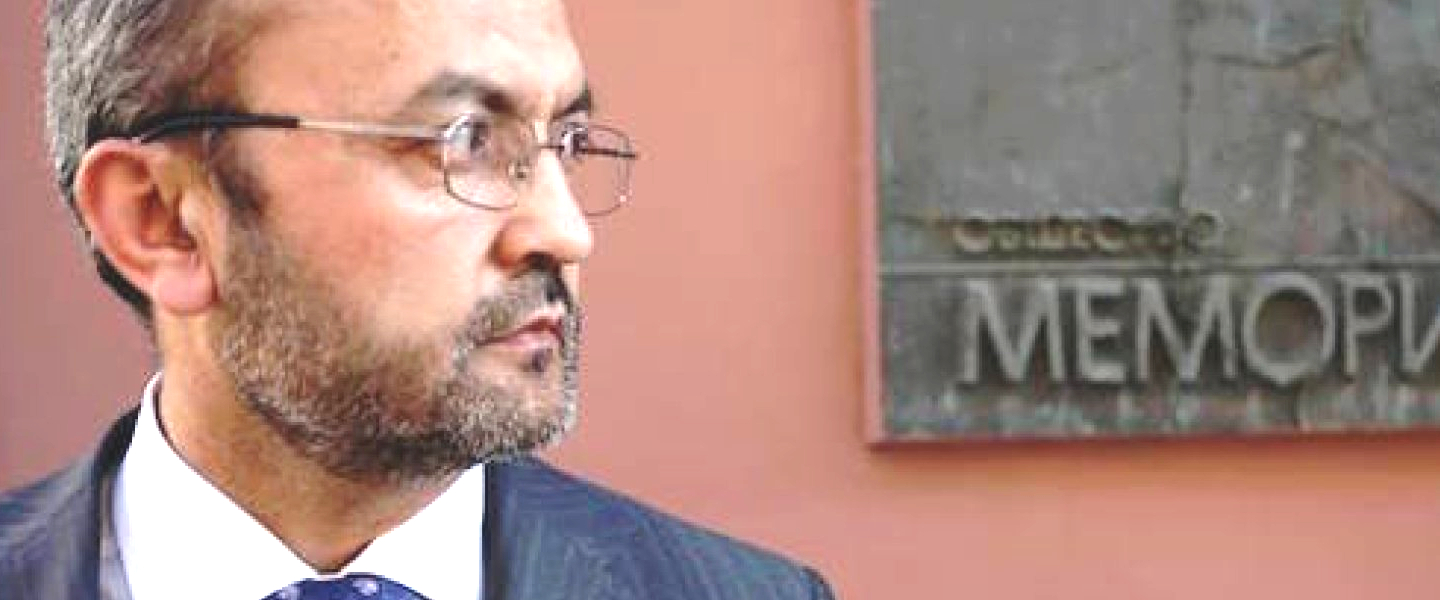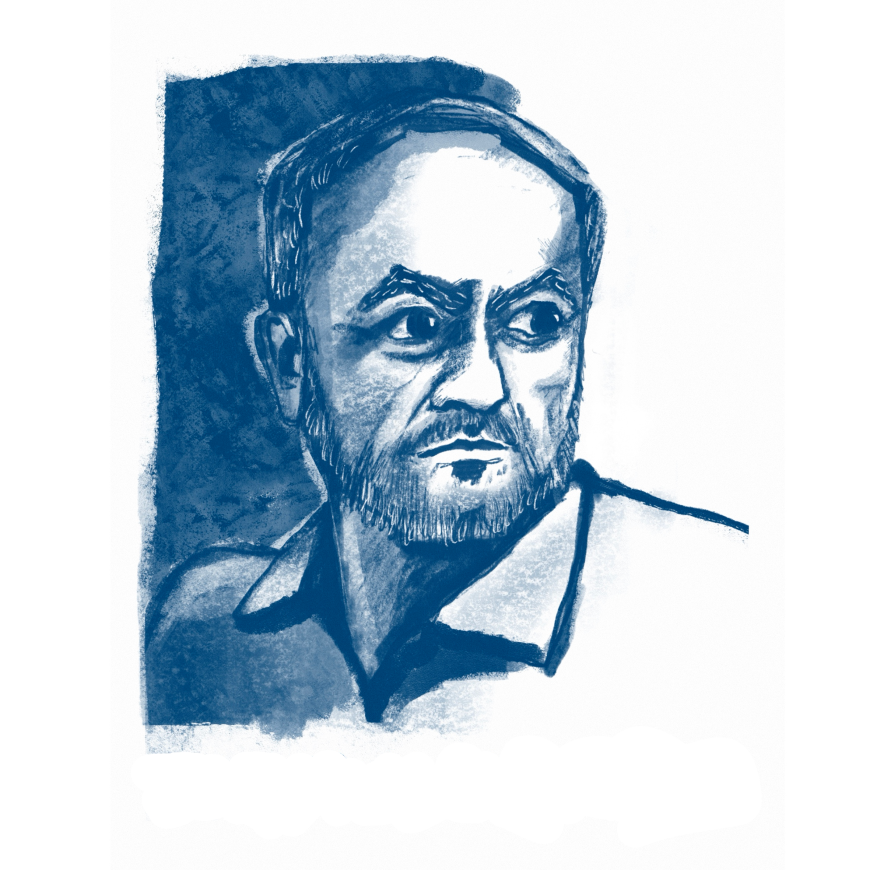published: 6 June 2024

Political prisoners in Russia: Bakhrom Khamroev
Human rights defender Bakhrom Khamroev has been in prison since February 24th, 2022, the first day of Russia’s full-scale war of aggression against Ukraine. He was wrongfully sentenced to 13 years and 9 months of imprisonment in a penal colony on “terrorist” charges.
Bakhrom Khamroev is a human rights defender and head of the Yordam Foundation for Legal and Social Support for Migrants. He was a member of the Memorial Human Rights Center until its liquidation in April 2022 and an activist of the Uzbek opposition People's Movement Birlik. A Russian court sentenced him to 13 years and 9 months in prison for “inciting terrorism” and “participating in the activities of a terrorist organization.” In prison, Khamroev has been subjected to physical violence and mistreatment.
Bakhrom Khamroev was born in Uzbekistan where he lived until 1992. He was one of the founding members and active participants in the Birlik movement, a movement in opposition to President Islam Karimov. After several members of the movement were arrested, Khamroev had to move to Moscow, where he has lived ever since. Khamroev is a Russian citizen and never acquired Uzbek citizenship.
For many years, Khamroev defended the rights of migrants from Central Asia in the Russian Federation, Russian Muslims, and refugees, and was involved in monitoring human rights violations in Uzbekistan.

What are the charges brought against Bakhrom Khamroev?
On the morning of 24 February 2022, in the first hours of the full-scale invasion of Ukraine, FSB officers raided Bakhrom Khamroev's apartment. He was taken into custody. Three days prior, the FSB’s Moscow Investigative Department opened a criminal case against Khamroev under Part 2 of Article 205.2 of the Russian Criminal Code: he was accused of carrying out “terrorism propaganda.” The case brought against him was prompted by six Facebook posts, of which two were reposts and one an external video link. According to the investigators, the human rights defender “promoted terrorism” by posting on his Facebook page material allegedly related to Hizb ut-Tahrir, an international organization banned in Russia. This international Islamist movement, whose ideology renounces violence, had been declared a terrorist organization by the Russian Supreme Court in a closed session back in 2003, despite a lack of evidence.
Immediately after his arrest, Russian state-controlled TV channels labeled Khamroev a "terrorist," while Rosfinmonitoring put him on a list of people involved in “extremism” and “terrorism” as soon as early March, before any verdict was made. The same month, Memorial’s offices (Memorial Human Rights Center and International Memorial) were raided in relation to this case as well; the connection between the searches and his case was not immediately clear.
Later, on December 9th, 2022, the FSB opened a new criminal case – related to “organizing the activities of a terrorist organization” (Article 205.5, Part 1 of the Criminal Code). The prosecutor's case was based on a forensic linguistic report of Khamroev's short speech at an “Islamic Conference” held in Moscow in 2011, as well as some other activities such as publishing articles, participating in the conference, employment counseling, filing complaints to the European Court of Human Rights and to Russian law enforcement agencies.
Khamroev pleaded not guilty. He claims that he has neither been a member of Hizb ut-Tahrir nor shared their views. He provided legal counseling to people unjustly accused of extremist and terrorist offenses. He believes the criminal proceedings against him are solely connected to his work as a human rights defendant and to his activism.
Moscow’s Second Western District Military Court heard Bakhrom Khamroev's case. On May 23rd, 2023, he was sentenced to 14 years of imprisonment, of which three would be served in prison and eleven in a high-security penal colony. The court found no indication that Khamroev had been an “organizer of a terrorist organization,” but did not acquit him. Instead, the court reattributed the charge to part 2 of article 205.5 of the Criminal Code, “participation in an organization recognized as a terrorist organization,” by striking several counts from the charge. In October 2023, the Military Court of Appeal reduced the sentence by three months.
The human rights project “Support for Political Prisoners. Memorial" recognizes Bakhrom Khamroev as a political prisoner. On August 21st, 2023, the Memorial Human Rights Center's legal team filed an appeal in support of Khamroev to UN Special Rapporteurs. The Special Rapporteurs expressed concern about the persecution of a human rights defender and sent a joint communication to Russian authorities concerning the case, which did not receive an answer within the allotted 60-day period.
Why the charges are untenable
The case of public justification of terrorism (Part 2 of Article 205.2 of the Russian Criminal Code) was initiated with reference to social media monitoring conducted by the FSB and the Interior Ministry’s Center for Combating Extremism. The investigation argued that Khamroev “carried out terrorism propaganda from 2018 to 2021” via his Facebook page.
In total, investigators referred to six posts. Four of them have nothing to do with Hizb ut-Tahrir; one is a repost of a text in Uzbek on the role of Hizb ut-Tahrir in the modern Muslim world; and the last one is also a repost: a reflection on the role of youth in the development of the Muslim community, the source of which, as is stated in the text itself, is the Hizb ut-Tahrir press office. None of these entries contain calls for violence.
Nevertheless, as in many other cases related to Hizb ut-Tahrir, experts brought in by the investigation have assumed that, following the Russian Supreme Court's 2003 decision to declare the organization “terrorist,” virtually any reference to it was considered to be propaganda or a call to terrorism, and the courts have been adopting this outlook.
The court found that Bakhrom Khamroev's participation in terrorist activities (part 2 of article 205.5 of the Russian Criminal Code) was substantiated by his speech at a Muslim conference legally held in Moscow in 2011. The text of Khamroev's speech, which was also submitted as evidence, is a short greeting for conference participants, with neither any mention of Hizb ut-Tahrir nor any calls to violence.
Publications related to Hizb ut-Tahrir found in Khamroev's apartment were also considered as proof of terrorist activity. He claimed that he needed these books as a source for his work in human rights and had no intention of distributing them (he owned a single copy of each). Finally, Khamroev was accused of providing legal assistance to several people the prosecution identified as members of Hizb ut-Tahrir (one of them, Rakhmiddin Komolov, has been imprisoned since 2016; Memorial considers him a political prisoner). Such assistance falls within the scope of fully legal human rights advocacy.
Khamroev's trial was held with procedural violations. The court admitted testimonies of secret witnesses, although there were no good reasons not to disclose their identities. In addition, the only expert witness during the trial was Danila Mikheev, known to the public as a professional informer who has produced dozens of “independent expert” reports on extremist and terrorist cases. The incompetence of Mikheev's reports, who started his career in forensic expertise at the age of 22 and without any specialized education, has been pointed out repeatedly by the professional community and even by the Russian Ministry of Justice. As in other trials involving Mikheev, he failed to appear before the court, thus depriving the defense of the opportunity to cross-examine the witness.
History of Bakhrom Khamroev's prosecution
The 2023 sentence is the most severe, but by no means the first episode in the history of judicial harassment Khamroev has faced because of his human rights and activism work over the years.
In 2003, the first criminal case was brought against him under Part 1 of Article 228 of the Russian Criminal Code (“Illegal acquisition, storage, transportation, manufacture, processing of narcotic drugs in large quantities”). Khamroev was sentenced to one and a half years of imprisonment. He pleaded not guilty, claiming that the drugs had been planted and that the actual motive for the prosecution was his political activities.
Later, Khamroev was repeatedly detained at protest rallies and sentenced to fines in administrative and criminal cases. In 2010, he was physically assaulted by an FSB officer, and in 2011 Khamroev was beaten up by a group of unidentified attackers - neither case was properly investigated by law enforcement agencies.
In 2021, the Prosecutor's Office of the city of Lyubertsy, a suburb of Moscow, sought to strip Khamroev of his Russian citizenship, alleging that he had acquired citizenship through marriage fraud. Law enforcers submitted a statement from Bakhrom's ex-wife, who later explained that she signed the statement under duress after FSB officers came to her house. There are reasons to believe that the purpose of this action was to deport Khamroev to Uzbekistan, where local security services were working to fabricate a criminal case against him.
The human rights project “Support for Political Prisoners. Memorial" believes that the numerous instances of legal action brought against Khamroev (the list we provide here is non-exhaustive), and their systematic nature point to political persecution. Memorial’s full argument for recognizing Khamroev as a political prisoner can be read here.
Translation by Sasha Zubritskaya
